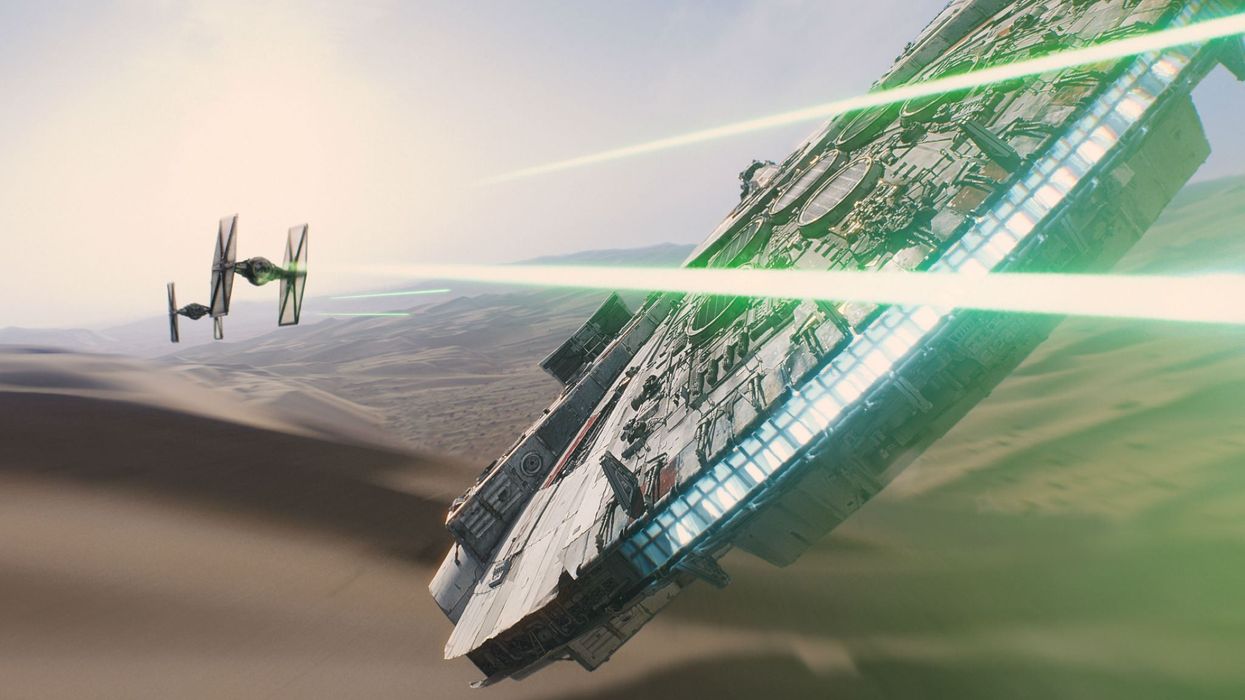'Star Wars,' 'Star Trek' VFX Artist Answers All of Your Burning Questions
Everything you ever wanted to ask one of the world's greatest VFX artists.

Todd Vaziri's resume is the envy of the visual effects universe. A 15-year veteran of Industrial Light & Magic, Vaziri is credited as the Lead Artist and Compositing Supervisor on many of the biggest recent blockbusters out there: Star Wars: The Force Awakens, Terminator Genisys, the Star Trek movies, Avatar, Iron Man 2, Super 8, Transformers, Harry Potter and the Goblet of Fire, Signs, and more.
Yesterday, Vaziri took to Twitter to answer some pertinent questions from his followers. In 140 characters each, his responses addressed the future of VFX, his most challenging shots, advice for aspiring artists, and the one big problem with the director-VFX artist collaboration.
Did any particular film(s) make you want to get into visual effects?
Vaziri: Probably, for me, it was the films of Robert Zemeckis and Jim Cameron that pushed me into visual effects. I wanted to DO that stuff.
Do you think of a digital VFX role as an artistic one, or a technical one, or a mix of both? Is there room for personal taste?
Vaziri: I'm incredibly non-technical, so I'd say mostly artistic. Almost everything I do is personal, just like actors acting. I'm probably the least technical person at ILM.
What's the most challenging visual effect you've ever worked on and why was it a challenge?
Vaziri: This (see below). Too complex to explain in a tweet.

Vaziri: For non-stunt choreography, the use of digital doubles is sometimes due to continuity issues (lighting consistency...an extra beat of stillness), and is sometimes more reliable (and less $) than photographing the actor again after the fact.
Do FX artists ever get specific directions to over exaggerate an effect for cinematic punch beyond the artist's comfort level?
Vaziri: Frequently. But, from my perspective, it's the director's movie. It's our job to consult and advise.
What's been your most challenging project?
Vaziri: A terrible but true answer: it's always the project I'm working on currently. (But the first Transformers was really hard.)
How do you divorce your work on a film from how you feel about its overall quality?
Vaziri: In Hollywood, we're lucky to work on ONE great movie in our entire careers. I've been lucky.
Today it seems like nothing is impossible for VFX, but have you run into a situation that was nearly impossible to pull off?
Vaziri: Yes. And it's always nearly impossible because of poor planning or a lack of vision. (Or not enough time & money.)
What's the collaboration process like with the director, producers, and other VFX artists?
Vaziri: Every film is different, so there's no one answer to that. My favorite situation is when the director is local...like when Ang Lee was here for Hulk, or Brad Bird for MI4 and Tomorrowland. More access is better!
What's your favorite shot (that you can talk about) that you've worked on in the last year or so? For what reason(s)?
Vaziri: The TIE fighter against the sunset shot (see below) was pretty darn gratifying. I'm still so tickled that people really like the shot.

Vaziri: Wild west right now. Lots of great stuff brewing, though.
What is your favorite trick in terms of "easy to do, impressive immediately"?
Vaziri: How about this: accurate, context-appropriate camera shake added to shots without cam shake. That's "easy" for me, but I'm a freak.
It seems to me that removing elements (puppeteers, etc.) in shots with a lot of motion may be harder than creating elements. Yes or no?
Vaziri: A good performance from a puppet ON THE DAY, even with the mechanics and puppeteers visible, is a victory. Removing the puppeteers is painstaking, difficult work, but it's a known-known, and totally doable.
Do you like it when directors are very involved, or prefer them to let the artists/VFX supervisors have more creative control?
Vaziri: My dream: one show with a director with strong vision and clear direction, followed by a show with a highly collaborative director... Repeat. Forever.
Is there a specific moment in a film that changed your opinion on what special effects could be?
Vaziri: The Abyss pseudopod.
Curious why CGI eyes are often dull and lifeless compared to other features. Why so hard?
Vaziri: Because humans are very very very very good at recognizing other humans. Very little margin of error for any synthetic human.

Vaziri: Not here yet, but I want to do away with bluescreens. That excites me.
Do you work with the cinematographer for visual continuity (to match the various lens characteristics that they chose to use)?
Vaziri: Sadly, most cinematographers are off the show once the first unit wraps. I relish the rare cases when the DP is involved in post.
What is your favorite type of VFX shot to work on? Subtle, invisible-to-audience, large space battles, or what?
Vaziri: I love spectacle, but I really really love doing invisible effects; shots you would NEVER guess are visual effects shots.
What is the value in compositing a fully CG shot instead of rendering it final?
Vaziri: You get a great deal more flexibility if you build your all-CG shot in layers and have a skilled compositor assemble it all.
Any advice for aspiring VFX artists such as myself?
Vaziri: You have the tools. Experiment, learn, most importantly MAKE MOVIES. Just do it.











